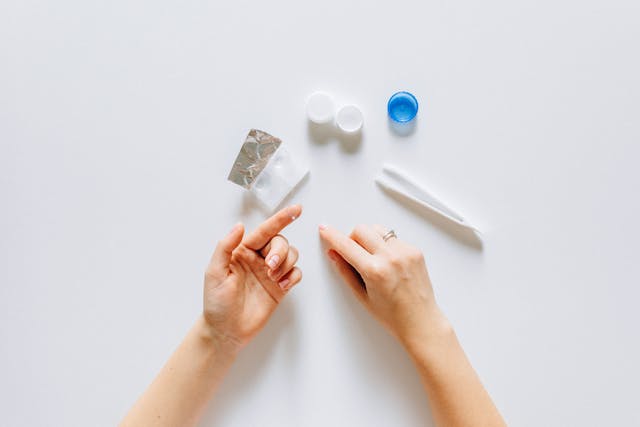
Contact lenses offer a convenient and effective alternative to glasses. Whether used daily or occasionally, proper care is necessary to maintain eye health and avoid potential complications. Here is more information on handling, cleaning, and using your lenses safely while addressing common concerns.
What Are Contact Lenses?
Contact lenses are thin, curved lenses that rest on the tear film covering the surface of your eyes. They are designed to correct vision or serve cosmetic purposes. Unlike glasses, contacts provide a broader field of vision and move naturally with your eye. Approved by healthcare professionals, they continue to be a helpful choice for their effectiveness and versatility.
What Are the Different Types?
Contact lenses come in a variety of options, each tailored to individual needs. The following types are available:
- Rigid Gas Permeable (RGP) Lenses: These less flexible lenses provide sharper vision and greater durability.
- Bifocal Lenses: These lenses are designed to provide clear vision at both near and far distances.
- Soft Lenses: Made from flexible plastics, these lenses allow oxygen to pass through to the cornea.
- Scleral Lenses: Large-diameter lenses that rest on the sclera, offering improved vision for various eye conditions.
- Single Vision Lenses: These lenses are designed to correct a single vision problem, such as nearsightedness or farsightedness.
- Specialty Lenses: Options like toric lenses for astigmatism and multifocal lenses for presbyopia exist for more specific vision needs.
Your choice depends on your vision correction requirements, lifestyle, and recommendations from an eye care professional.
What Are Common Issues With Contact Lenses?
While contact lenses are a safe and effective vision solution, improper use or care can lead to challenges. Wearers may experience dryness and irritation, which may be prevalent among computer users or those in dry environments. Lens discomfort is another issue, often caused by improper cleaning, incorrect use, or damage to the lenses.
More serious concerns include eye infections, which can result from poor hygiene or wearing lenses beyond their recommended duration. Using damaged or expired lenses may lead to reduced or blurry vision. Identifying and addressing these problems quickly is beneficial to avoid further complications and maintain healthy eyes.
How Should You Properly Care for Them?
Taking care of your contact lenses involves consistent and thorough cleaning, handling, and storing practices. Here’s how to do it correctly:
- Wash Your Hands
Before touching your lenses, wash your hands with soap and water.
- Use Approved Cleaning Solutions
Clean your lenses using a solution recommended by your eye doctor.
- Store Lenses Safely
Keep your lenses in a clean contact lens case filled with fresh solution each time.
- Avoid Overuse
Stick to the wearing schedule provided by your lens manufacturer or healthcare provider.
By incorporating these steps into your routine, you can protect your eyes while enjoying the benefits of these lenses.
Also Read: Transparent Elegance: How Clear Lenses Are Redefining Fashion Eyewear?
What Else Should You Know?
Regular eye check-ups are helpful for maintaining healthy lens wear. Your eye care provider can monitor your eye health and make sure your prescription remains accurate. Follow professional advice when using contact lenses and consult with your doctor if you experience discomfort or persistent issues.
Learn Proper Care Today
Proper contact lens care is the key to clear vision and healthy eyes. With the right practices and regular check-ins with an eye care professional, you can enjoy safe contact lens use. Implement these tips today for a worry-free lens-wearing experience. Consult an eye specialist for further treatment options.








